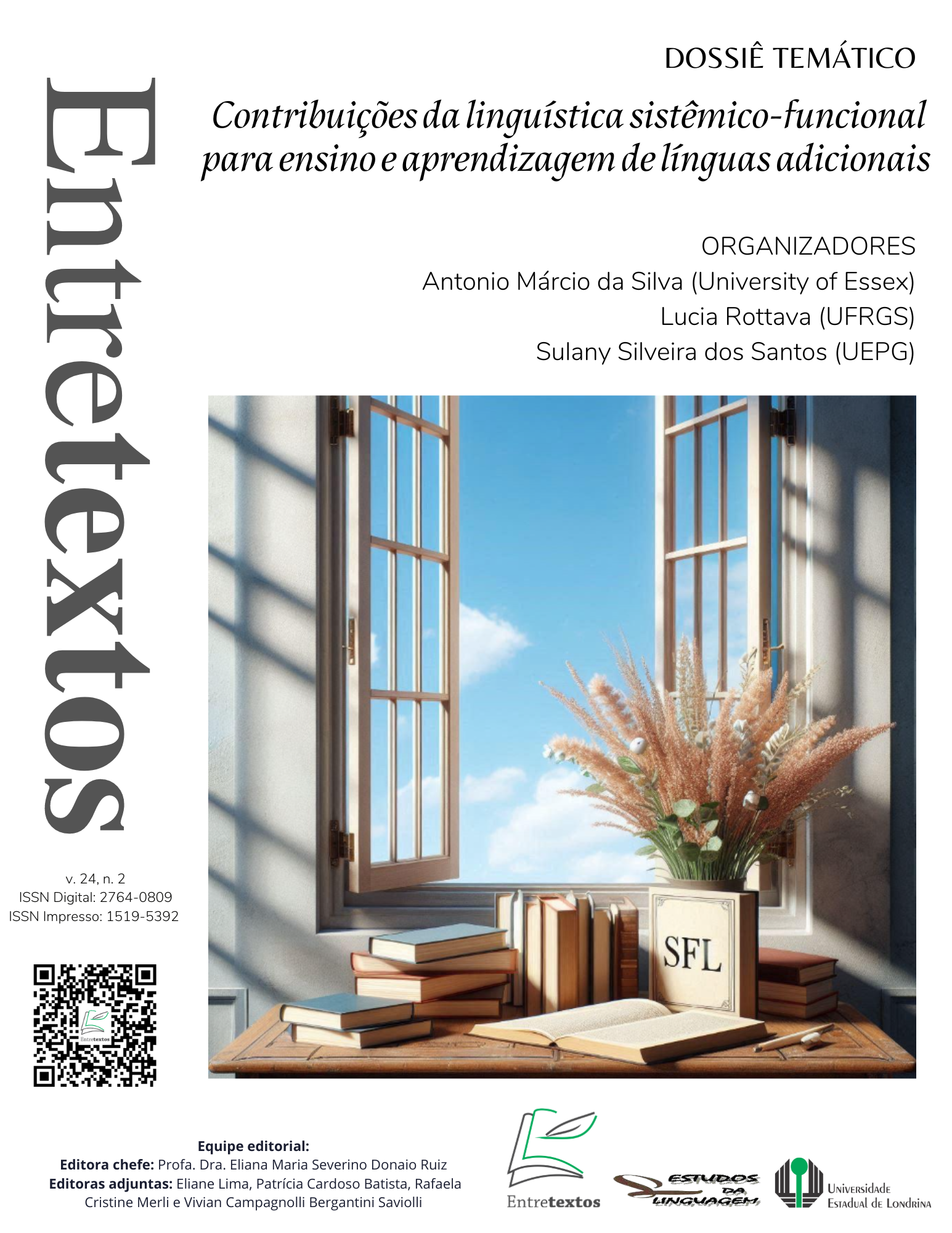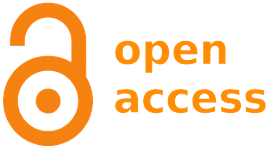A experiência de ensino-aprendizagem da escrita acadêmica em inglês com o Programa Ler para Aprender
DOI:
https://doi.org/10.5433/1519-5392.2024v24n2p52-70Palavras-chave:
programa ler para aprender, linguística sistêmico-funcional, ensino de inglês como língua adicional.Resumo
Este artigo relata a contribuição da Linguística Sistêmico-Funcional em uma experiência de ensino-aprendizagem ao levar os participantes à conscientização acerca do recurso linguístico da metáfora gramatical e, consequentemente, à incorporação desse recurso em sua escrita acadêmica. A metodologia empregada foi embasada na própria proposta pedagógica apresentada pela Linguística Sistêmico-Funcional com sua Pedagogia com base em gêneros através da dinamização do Programa Ler para Aprender. O estudo teve como participantes graduandos em Letras/Inglês como língua adicional e o corpus da pesquisa é composto de textos do gênero Relatório do Estágio de Observação. Os resultados mostram que após a dinamização do Programa Ler para Aprender houve a aprendizagem e o domínio do recurso linguístico estudado, por parte dos estudantes, além da instrumentalização destes sujeitos, futuros professores de Inglês como Língua Adicional /ILA, em relação à metodologia trazida pela Linguística Sistêmico-Funcional. A contribuição teórico-prática diz respeito a uma metodologia que auxilia os futuros professores no ensino da escrita.
Downloads
Referências
BARBIER, R. A pesquisa-ação. Trad. Lucie Didio. Brasília: Liber Livro, 2002.
DEVRIM, DY. Development of grammatical metaphor in academic literacy through online language support. Australia: Unpublished Ph.D. dissertation, University of Sydney, 2013. Disponível em: https://ses.library.usyd.edu.au/handle/2123/22685, Acesso em 20 fev. 2023.
DEVRIM, D.Y. Grammatical Metaphors: What do we mean? What exactly are we researching? Functional Linguistics, v. 23,p. 32-51, 2015. https://doi.org/10.1186/s40554-015-0016-7, Acesso em 20 fev.2020 DOI: https://doi.org/10.1186/s40554-015-0016-7
DÖRNYEI, Z. Research methods in applied linguistics. New York: Oxford University Press, 2007.
HALLIDAY, M. A. K. Language as a social semiotic: The social interpretation of language and meaning. London: Edward Arnold, 1978.
HALLIDAY, M.A.K. Spoken and written modes of meaning. Article published by Armidale CAE for the Language in Education Conference. Armidale, November,1985.
HALLIDAY, M.A.K. 'On the Language of Physical Science'. Mohsen Ghadessy (ed.) Registers of Written English: Situational Factors and Linguistic Features. (OLS). London: Pinter. pp. 162-178, 1988.
HALLIDAY, M.A.K. 'Towards a Language-based Theory of Learning'. Linguistics and Education, v. 5, n. 2, p.93-116, 1993. Disponível em: https://www.academia.edu/24675860/Towards_a_Language_Based_Theory_of_Learning. Acesso em 20 fev.2020 DOI: https://doi.org/10.1016/0898-5898(93)90026-7
HALLIDAY, M. A. K. 'The Construction of Knowledge and Value in the Grammar of Scientific Discourse, with Reference to Charles Darwin's The Origin of Species'. Coulthard, Malcolm (ed.) Advances in Written Text Analysis. London/ New York: Routledge. pp.136-156. 1994.
HALLIDAY, M.A.K. The Notion of 'Context'. In Language Education. Mohsen Ghadessy (ed.) Text and Context in Functional Linguistics. (CILT169). Amsterdam/Philadelphia: John Benjamins. p.1-24. 1998. DOI: https://doi.org/10.1075/cilt.169.04hal
HALLIDAY, M. A. K. Introduction: how big is a language? On the power of language. In: the language of science. London: continuum, 2004.
HALLIDAY, M.A.K. An Introduction to Functional Grammar. A Hodder Arnold Publication; 2nd Edition. New York. 1994.
HALLIDAY, M.A.K., e J.R. MARTIN. Writing science: Literacy and discourse
power. London: Falmer Press, 1993.
HALLIDAY, M. A. K.; MATTHIESSEN, C.M.I.M. Construing experience through meaning: A language-based approach to cognition. London/New York: Cassell, 1999.
HALLIDAY, M. A. K.; MATTHIESSEN, C.M.I.M. An Introduction to Functional Grammar. 3. ed. London: Arnold, a member of the Hodder Headline Group, 2004.
HALLIDAY, M. A. K.; MATTHIESSEN, C.M.I.M. An Introduction to Functional Grammar. 4a. ed. London: Arnold. 2014. DOI: https://doi.org/10.4324/9780203783771
HALLIDAY, M. A. K. Methods Techniques Problems. In M. A. K. HALLIDAY, & J. J. WEBSTER (Eds.). Continuum Companion to Systemic Functional Linguistics. London: Continuum, p. 59-86, 2009.
HEYVAERT, L. Nominalization as grammatical metaphor. On the need for a radically systemic and metafunctional approach. In: SIMON-VANDENBERGEN, A.-M.; TAVERNIERS, M. Grammatical Metaphor: Views from systemic functional linguistics. Amsterdam: Benjamins, 2003. p. 65-99. DOI: https://doi.org/10.1075/cilt.236.05hey
MARTIN, J. R. English text: System and structure. Amsterdam: John Benjamins, 1992. DOI: https://doi.org/10.1075/z.59
MARTIN, J.R. Grammar meets Genre. Reflections on the 'Sydney School', Arts: the journal of the Sydney University Arts Association, v. 22, p.47-95. 2000. Disponível em: https://openjournals.library.sydney.edu.au/ART/article/view/5596, Acesso em: 20 fev. 2020.
MARTIN, J. R.; ROSE, D. Working with Discourse: Meaning beyond the Clause. London and New York: Continuum, 2003.
MARTIN, J.R.; ROSE, D. Designing literacy pedagogy: scaffolding asymmetries. In R. Hasan, C.M.I.M. Matthiessen and J. Webster (eds.) Continuing Discourse on Language. London: Equinox, 251-280. 2005.
MARTIN, J. R.; ROSE, D. Genre relations: Mapping culture. London: Equinox, 2007.
MCMILLAN, J. H.; WERGIN, J. F. Understanding and evaluating educational research. 4th ed. Boston: Pearson, 2010.
MOYANO, E.I. Escritura académica a lo largo de la carrera: un programa institucional. Revista Signos, v. 43, n. 74, p. 465-488, 2010. Disponível em: https://www.scielo.cl/scielo.php?script=sci_arttext&pid=S0718-09342010000500004. Acesso em 20 fev.2020. DOI: https://doi.org/10.4067/S0718-09342010000500004
ROSE, D. Genre in Sydney School. In: James Paul Gee e Mike Handford. (Eds.). The Routledge handbook of discourse analysis. Londres: Routledge, 209-225, 2012.
ROSE, D. Analysing pedagogic discourse: an approach from genre and register Functional Linguistics, p. 1:13. Disponível em: http://www.functionallinguistics.com/content/1/1/11, http://www.springer.com/-/2/5acb361cd6f34acd9810403ab1890dc3 2014. Acesso em 20 fev.2020.
ROSE, D. Reading to Learn: Accelerating learning and closing the gap. Teacher training books and DVDs. Sydney: Reading to Learn, 2015. Disponível em:http://www.readingtolearn.com.au. AcessOem: 20 dez. 2019.
ROSE, D. Reading to Learn - preparing for reading and writing - vol 1. Austrália, 2017a.
ROSE, D. Reading to Learn - selecting and analyzing texts - vol 2. Austrália, 2017b.
ROSE, D. Reading to Learn - assessing writing - vol 3. Austrália, 2017c.
ROSE, D. Reading to Learn - detailed reading and rewriting - vol 4. Austrália, 2017d.
ROSE, D. Building a pedagogic metalanguage I: curriculum genres. In K. Maton; J.R. Martin; Y.J. Doran (eds.). Studying science: Knowledge, language and pedagogy. Chapter 9. London: Taylor & Francis, 2020a.
ROSE, D. Building a pedagogic metalanguage II: Knowledge genres. In K. Maton; J.R. Martin; Y.J. Doran (eds.). Studying science: Knowledge, language and pedagogy. Chapter 10. London: Taylor & Francis, 2020b.
ROSE, D.; MARTIN, J. R. Learning to Write, Reading to Learn: Genre, Knowledge and Pedagogy in the Sidney School. Sheffield (UK), Bristol (USA): Equinox Publishing Ltd. 2012.
SARDINHA, T. B. Metáforas de Lula e Alckmin nos debates de 2006 em uma perspectiva da Linguística de Corpus. Revista Brasileira de Linguística Aplicada. Belo Horizonte, v. 7, n. 2, p. 139-164, 2007. https://doi.org/10.1590/S1984-63982007000200007. Disponível em: https://www.scielo.br/j/rbla/a/mXxqG67CNXfTtG76h5fcnfL/?lang=pt. Acesso em 20 fev. 2020. DOI: https://doi.org/10.1590/S1984-63982007000200007
Downloads
Publicado
Como Citar
Edição
Seção
Licença
Copyright (c) 2024 Karen Santorum

Este trabalho está licenciado sob uma licença Creative Commons Attribution 4.0 International License.
Entretextos adota a Licença Creative Commons Attribution 4.0 International, portanto, os direitos autorais relativos aos artigos publicados são do/s autor/es.
Sob essa licença é possível: Compartilhar - copiar e redistribuir o material em qualquer suporte ou formato. Adaptar - remixar, transformar, e criar a partir do material, atribuindo o devido crédito e prover um link para a licença e indicar se mudanças foram feitas.























